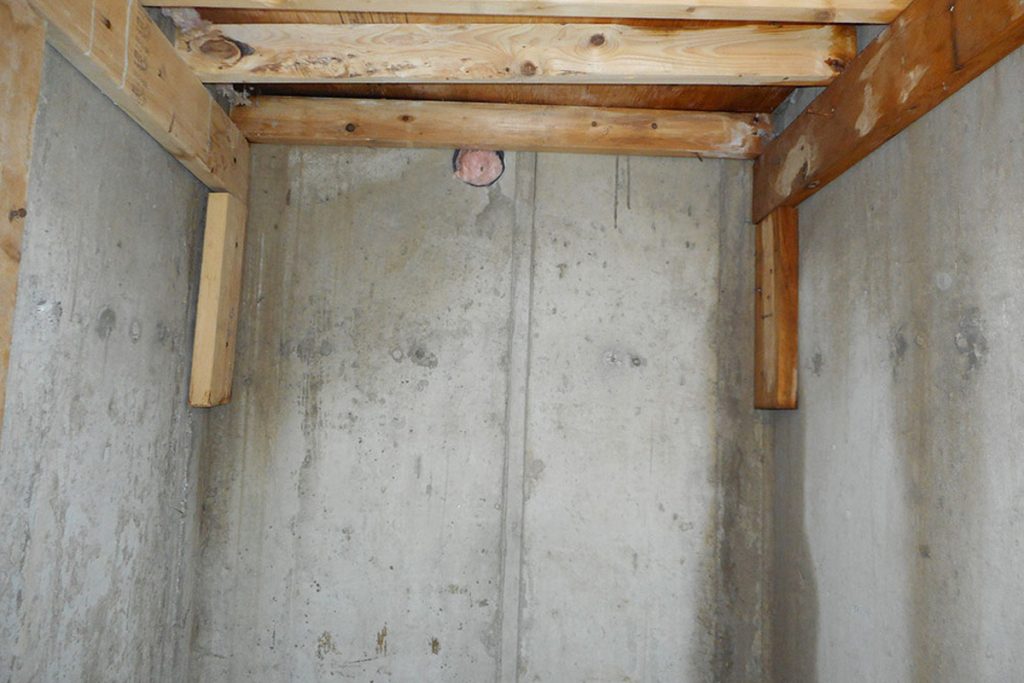Many people are surprised when they discover water in their basement for the first time and don’t understand why basement walls leak. While most basement walls don’t leak everyday, basement leaks are very common, regardless of the age of the home, and a fact of life in regions with a significant amount of rainfall and snow. In this post we explain why basement foundation walls leak and the typical sources of basement leaks.
Assuming that the water you are seeing on your basement floor is actually the result of a leaking basement wall and not some other kind of leak, groundwater has found a way to penetrate through your foundation. Very simply, there is a hole in the wall that is allowing water to get into your basement.
Hydrostatic pressure and basement wall leaks
The water in the soil surrounding your basement constantly applies pressure onto your foundation walls. The more water present in the soil from rains and/or melting snow, the more pressure is applied to your foundation.
As a simple analogy, a soft drink can contains a fair amount of fluid, if we make an extremely tiny pin hole in the can the soft drink will leak out. Similarly, if there is a hole in a basement wall, water pressure from the soil against the foundation wall will cause water to leak out of the hole (or crack); in some cases this will only happen after unusually heavy rains, and in other cases, water will leak from the basement wall most of the time.
The most common foundation wall leaks
The holes (or gaps) in a foundation wall that are typically at the source of the leak will vary according to the type of foundation on which a home is built. Most foundations built since the 1940s are either cinder block (concrete block) or poured concrete; we will deal with leaks through these types of foundation walls exclusively.
Leaks in poured concrete basement walls
The two most common sources of basement leaks in poured concrete foundations are:
- Cracks; and
- Tie-rod holes.
Both of these can be inexpensively and quickly repaired by injecting them from inside the home; alternatively, the foundation can be excavated and waterproofed at the crack and tie-rod hole locations.
Leaks in cinder block foundation walls
Like poured concrete foundations, cinder block basement walls also have two very common sources of basement leaks:
- Cracks in the mortar joints between the concrete blocks; and
- Cracks in the blocks themselves.
Unlike poured concrete foundations, concrete block wall leaks are different because the cracks allow water to penetrate the basement walls and then, because cinder block walls are hollow, water pools within the walls and tends to seep out gradually. The way to fix leaks in block basement walls is more complicated than for poured concrete walls.
Follow this hyperlink for more information on fixing concrete block foundation leaks.
Click on this hyperlink for a comprehensive article on the most common sources of basement leaks.
The role that eavestroughs and grading play in causing basement leaks
Many people, even supposedly knowledgeable contractors, believe that eavestroughs and improper grading are responsible for leaky basement walls; actually, this notion is not technically correct.
When the grade (or slope) of your landscaping causes surface water to travel towards your house, or if an eavestrough is dumping water close to your foundation, what is actually happening is that the amount of water in the soil next to your foundation is increasing. This increased amount of water adds to the hydrostatic, or water, pressure against your foundation.
It is not pressure itself that causes your basement to leak; rather, the higher pressure results in basement leaks because all of this water is able to penetrate the foundation wall because there is a hole in it. Repair the holes in the foundation wall and no amount of pressure will result in a basement leak – ever. Want help? Contact us
